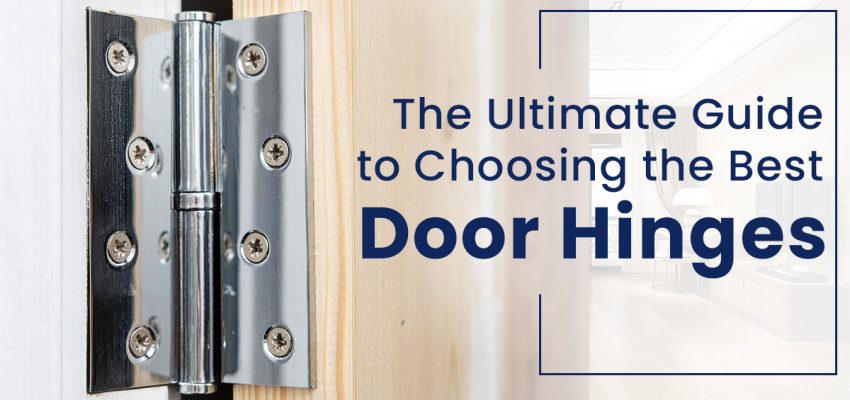In our interiors, the door hinges are selected to play an integral yet often overlooked role in ensuring functionality, security, visual appeal, and longevity. As the critical mechanical components that govern the manner and efficiency by which doors operate, door hinges influence factors ranging from accessibility and noise control to fire safety and overall aesthetics.
Post your Requirement
Whether upgrading existing doors or installing new ones, identifying and investing in door hinges that specifically fulfill commercial requirements is essential. This extensive guide explores the considerations for selecting suitable door hinges, top-rated options optimized for robust performance, expert tips for seamless installation, and maintenance best practices for enhanced durability.
Why Thoughtful Hinge Selection Matters
Door hinges are the unsung workhorses that quietly determine the structural integrity, unencumbered operation, safety, and experience of indoor movement in commercial spaces. The market offers a diverse range of hinge varieties engineered for particular needs across industries. Choosing commercial-grade door hinges based on property type, door dimensions, and expected traffic flow is key to achieving reliable functionality.
Additionally, aspects such as ease of maintenance, load-bearing capacity, corrosion resistance, and design cohesion must be evaluated when selecting the ideal hinges. By understanding technical product specifications and adhering to manufacturer recommendations, commercial spaces can invest in durable hinges that effortlessly facilitate secure and consistent door performance across high-traffic environments.
Key Factors to Consider For Hinge Selection
When selecting hinges, crucial factors include:
- Door Material and Properties: Identifying the specific materials used for existing or intended doors – whether wood, glass, aluminum, or hollow/solid core – directly influences suitable hinge options. Consider corresponding properties like weight, thickness, and fire rating when determining adequate load-bearing capacities and appropriate hinge materials that can be safely and securely mounted.
- Accessibility Requirements: Determine accessibility needs in terms of door swing clearance, opening width, and latching mechanisms. Choosing hinges that accommodate disability access standards and the expected movement of goods/equipment enables seamless navigation.
- Expected Traffic Flow: Assess typical door use patterns, such as employee vs customer entryways, frequency of opening, occupant capacity, and likelihood of abuse/accidents. Prioritize hinges engineered for durability, adjustable alignment, and easy repairs accordingly.
- Security Requirements: Establish perimeter safety needs, opportunities for internal monitoring, and consequences of tampering/vandalism. Opt for hinges with security studs, integrated alarm contacts, and vandal-resistant designs for vulnerable access points.
- Noise Transfer Resistance: Consider interior acoustics and privacy needs when selecting hinges. Ball bearing hinges minimize friction and hydraulic models softly close doors to limit disruptive noise and bolster soundproofing.
- Aesthetic Cohesion: Ensure finishes, shapes, and decorative elements coordinate with surrounding architecture and design vision. Custom branding on hinges or integrated architectural metals visually elevates spaces while fulfilling functional purposes.
Installing Hinges for Optimal Results
To actualize the intended benefits, proper installation of commercial door hinges according to manufacturing guidelines is imperative. Trained professionals may be needed for intricate applications. Key aspects include:
Accurate Hinge Positioning – Precisely follow spacing and height recommendations when embedding into frames or drilling mounting holes.
Door Pre-fitting – Test thoroughly for swing clearance before permanent installation to confirm full functionality then make any adjustments.
Proper Fastening – Use manufacturer-recommended screws for hinge models and sufficient anchors for door frame materials to reinforce load-bearing capabilities once mounted.
Post-installation Testing and Troubleshooting – Inspect door swing action, alignment, and closure positioning; remedy any sticking or gaps indicating issues.
Maximizing Lifespan Via Maintenance
Taking proactive measures to care for commercial door hinges enhances longevity and sustained performance. Basic quick-win strategies involve:
Regular hinge lubrication using appropriate oil/grease to ease movement.
Tightening loose screws that compromise integrity.
Ensuring surrounding frame, floor, and hinge areas remain generally clean without visible particle buildup over time through periodic wiping.
For high-functioning residential and commercial facilities, investing in advanced hinge options to match security, accessibility, aesthetics, and resilience needs is well justified. This guide outlines factors guiding suitable selections followed by expert insight into leveraging door hinges for fortified operations. Specifying the right commercial-grade hinge model and grade along with proper installation sets up durable, reliable performance for years beyond initial use and cost.
FAQs
Q-1. What material works best for hinges on heavy commercial doors?
A-1. Stainless steel is an ideal hinge material for heavy commercial doors given its durability, corrosion resistance, and reliability in high-traffic environments.
Q-2. What is the recommended lubrication frequency for commercial door hinges?
A-2. Lubricating commercial door hinges approximately every 6 months ensures continued smooth movement, reduced friction, and extended performance lifespan.
Q-3. What kinds of finish options are typically available for commercial door hinges?
A-3. Commercial door hinges come in various aesthetic finishes like chrome, brass, and matte black that can match and complement a space’s overall design and color scheme.
Q-4. When is it necessary to replace commercial door hinges?
A-4. Replacing commercial door hinges is necessary when visible damage, noise, misalignment, loose screws, or improper door closing/sagging occurs indicating deterioration.
Q-5. What design features enhance security in commercial door hinges?
A-5. Security features like non-removable pins, interlocking leaves, and tamper-proof fasteners prevent disassembly and make commercial door hinges more secure.
Q-6. Is customization of commercial door hinges possible?
A-6. Yes, commercial door hinges can be customized in terms of size, shape, metal finishes, and engraving to match specific architectural and design requirements.
Q-7. How can noisy hinge operation be corrected?
A-7. Applying lubricant, tightening loose screws, realigning doors, and installing ball bearing or hydraulic hinges help to quiet noisy commercial door hinges.
 Get App
Get App 




















Post A Comment